- Home
- Dave Gross
King of Chaos Page 22
King of Chaos Read online
Page 22
"Leave him to me," said Aprian. "Naia was there also. You heard what she had to say."
All eyes turned to the Qadiran ranger. "It was the captain who told us to flee. We obeyed her. Radovan was the only one to stay."
Jelani stepped forward. "Count, I know that you believe what you're telling us. But is it not possible you are confused? Radovan said that reading the Lexicon was having an effect on you."
I turned to Radovan for an explanation.
He shrugged. "I was worried about you, boss. If that book was messing with your mind, I figured Jelani was the one who'd know how to fix it."
Tolliver groused, "It doesn't take an evil book to cloud that man's senses. I can smell the wine on his breath from here."
"It is my custom to drink a glass or two while at study."
The clink of glass sounded behind me. The Chelaxian Bolivar held up a pair of empty bottles he had pulled from the floor of the carriage. "Big glasses."
I could not help but feel betrayed by my fellow countryman.
"Listen up, everybody," said Radovan. "We can work out all this stuff later. For now, we've got to move. They found us once to steal the book. That means they can find us again, this time with more than just a thief."
"He's right," said Naia. She scanned the night sky.
"I concur," said Aprian. "Where do we go?"
"Well, we were headed back to Valahuv."
"We're no longer welcome there," said Urno.
"Right," said Radovan. "So we don't go into the village. But we ought to take a look. Let's say Kasiya's got his thumb on Oparal. She's as tough as anybody I ever met, so my money's on she breaks free. When she does, Valahuv's the closest place where she knows to look for us."
Irritated that Radovan had taken it upon himself to take charge, I pointed out the danger. "Yet if Oparal is in Kasiya's thrall—as all evidence suggests—then it is also where he will know to look for us."
"We stick to the swamp, keep ourselves hid. Meanwhile, you and Jelani maybe want to take a look at this." He picked up his saddlebags and withdrew a familiar volume.
"My last journal!"
"Yeah," he grinned.
I could hardly believe the evidence of my eyes. "You took it!"
"I borrowed it is all. What are you complaining about? Maybe the bad guys got the Lexicon, but you still have a copy."
"That's not the point!" I snatched it away from him. My pulse pounded in my temples. "You had no right to remove my belongings without—" Anger whirled in my head, not only at Radovan's presumption in taking my journal from the carriage but also at—I knew not what. The formlessness of my rage and despair terrified me. It was as if I could not control my own behavior. I—
"Boss?" said Radovan. "You all right?'
Everyone stared at me. I realized I had been clutching my face. As I withdrew my hands, I saw blood on my fingernails and felt the sting of air upon my scratched cheeks.
"It doesn't matter, anyway," I said. "The powers of a tome like the Lexicon are not limited to the information conveyed in its text. Its pages are infused with arcane materials, the bindings blessed—or cursed, as the case may be—with hundreds of incantations. Possessing a copy does not ensure the ability to perform the rituals inside."
Jelani approached. She reached for the journal. I held it away from her.
"Your Excellency," she said, "with your permission, I would like to aid in your study of the book."
With reluctance, I surrendered the volume to her hands.
"If I may, I'll study it with you in the carriage."
"I will come also," said Alase.
"Why?"
"The last people to use this book were the Three: a wizard, a druid, and a witch."
"And you think a wizard, a sorcerer, and a sum—a god caller—can better unravel its mysteries than one who has studied the arcane longer than your great-grandmother lived?"
She bobbed her head in the affirmative.
"I—" Her logic was not at fault, but I disliked it all the same.
Jelani said, "Differing perspectives could be of some help, even to a learned scholar."
"Very well. Radovan, you and Sergeant Aprian make the arrangements to move on."
"You got it, boss." Radovan went to supervise breaking camp and hitching the vehicles. He shouted at the unicorn, "You coming, big fella?"
Bastiel tossed his mane, but remained at the edge of camp.
"Yes or no?" said Radovan. "Just answer the question."
"Maybe I should deal with him." Aprian gave Radovan a quizzical look before approaching the unicorn. As the paladin neared, the unicorn shied but did not flee.
"Don't let him fool you, Sarge," said Radovan. "He can talk just fine. He's just pretending."
Aprian narrowed his eyes. "How much of the Lexicon did you read?"
Radovan shot him the tines, but Aprian just shrugged.
Their banter piqued my feeling of isolation. I was losing control of the expedition. If I could not regain my authority, the entire venture would fall to shambles. Yet all I could think to say was, "Arnisant, heel."
The wolfhound came instantly to my side. I had at least one faithful ally.
The company broke camp in a matter of minutes. The drivers had my magnificent Kyonin horses hitched to the carriage soon after. Once all was prepared, I stepped aboard, pausing only to empty the silver bucket and dispose of the empty wine bottles.
Jelani and Alase followed, taking places across the map table. Arnisant leaped in, turned thrice, and settled on my feet, warmer than the finest slippers—although I would need to move periodically lest his ever-increasing mass numb my toes.
As I closed the door behind the hound, Jelani winced and opened the window. She glanced at Alase, who did the same on the other side. While the need to air my sanctum mortified my pride, I nodded my thanks.
Jelani laid my journal on the table. "Would you describe the effect you feel when reading the Lexicon?"
"What? Am I to be examined like a patient visiting a physician?"
"Please, Count."
I drew a deep breath. I was aware that my temper had grown short, but that in itself was a reasonable response to the unreasonable events of the past day. Still, I had no wish to alienate well-intentioned allies, no matter how clumsily they pressed their assistance upon me.
"Very well," I said. "As you have seen, the text consists of five distinct languages and two different sets of Hallit pictograms. Fortunately, I have some facility with all of the represented scripts."
Jelani failed to conceal a smirk at my simple statement of fact. It was not a boast!
"I have perused the book twice," I continued, "the second time while inscribing its contents into this journal. How much have you read?"
"Far less," she admitted. "I lack your expertise with languages, but the truth is that I stopped reading after only a few passages that I could understand. Even apart from the troubling subject matter, the arcane expressions seem contradictory—maddeningly so, if you will pardon the expression. I cannot help but point to the name of the book: the Lexicon of Paradox."
"Yes!" A great wave of relief broke over me as I realized that at least one among our company could understand what I had seen. I opened the journal to an especially interesting passage. "The contradictions are most apparent when one compares the passages in Thassilonian to the pictograms of the Kellid wizard."
"Druid," said Alase.
"Pardon me?"
"Those are druids' runes, not wizards'."
"And you know this because—?"
"I had it from the stories I learned from my uncle, who had it from his—"
"Mother, who had it from her aunt, and so on. Yes, so I recall."
"Alase makes an important point," said Jelani. "Those who first opened the portals combined the powers of three different disciplines to do so."
Of course, I had already considered that fact, but apparently it would appear pompous to say so. Instead, I said, "The Lexicon is in
deed well named. The rituals it contains not only combine disparate philosophies and energies, but also appear to be complete oxymorons."
"I don't understand," said Alase.
"That's because the count is demonstrating his vast vocabulary," said Jelani. Her sidelong glance assured me that her provocation was intentional, but her smile disarmed me before I could grow angry. "It's not so difficult to understand, actually. These contradictions in the text are the key. Not despite their logical flaws, but because of them, they invoke the most primal elements of arcane, elemental, and demonic energies."
"No, no," I said. "It may appear that way, but I assure you these seeming incongruities disguise comprehensible formulae that we can use to duplicate or reverse the process that first opened the Worldwound."
Jelani fixed her gaze to mine. At first I took it for insolence, but as her expression softened I realized it was a look of genuine concern. "Do you have a soft cloth, Count?"
Momentarily perplexed, I reached for my handkerchief but realized the bloodstained cloth was entirely inappropriate to hand a woman. Lifting up the seat compartment beside me, I found a clean chamois and passed it to her.
Jelani took it without a word of thanks. She unfolded and refolded the cloth before covering her finger and uttering a word of magic. A blue-white radiance pulsed beneath the cloth and subsided. She handed the cloth back to me. It felt as cool as if it had been stored for hours in an icebox.
I wondered whether her gesture was some secret suggestion pertaining to the Lexicon. Surely she could not think the book could overhear our conversation! Surely not, for before us lay only a copy, and my duplication of its text could not possibly have transferred the Lexicon's innate arcane qualities.
Or could it? Had the bark upon the Lexicon's cover been thick and irregular enough to conceal an auditory organ? If so—
"Count," said Jelani. She pressed her palm gently upon her cheek. "For your bruise."
Perplexity held me a moment longer before I understood what she meant. "Oh! Of course. How silly of me."
I held the cool cloth against my cheek. In the turmoil of my imagination, I had quite forgotten the pain. Now that I thought of it, both my face and my head throbbed.
In its way, the pain was welcome. It focused my thoughts on injury. Reluctantly, I began to accept the likelihood that reading the Lexicon had injured me far more deeply than Oparal's punch had done. It had wounded not my body but my sole and sacred possession: my mind.
I pulled my copy of the Lexicon close but stopped myself before opening the cover.
Jelani and Alase watched me from across the table. The Thuvian's expression alternated between concern and curiosity. The Kellid's face was a study in pity.
I pushed the Lexicon back to the center of the map table.
"I am injured," I said. Gesturing to my brain, I added, "In here."
Jelani nodded. "Good. I mean, it is good that you recognize the danger."
"Yet the greater danger is that Kasiya now has the original, as well as the Lacuna Codex. The rituals within the Lexicon are not limited to opening portals. Without a better understanding of its contents, we can't know what he is capable of doing."
Alase slid the journal close to her and opened it with two fingers. Frowning, she skimmed the pages, seeming to focus on the illustrations. She did not react to their horrific subjects, but at last she closed the cover and pushed the book away. She looked at Jelani, then me, and shrugged. "He will call a god."
Jelani smiled indulgence. "You said the same of Radovan's transformation. Is that how you see all acts of magic?"
Alase jutted her jaw. "Wizards think everything is complicated. Sorcerers think magic comes from inside them. My people understand that the world is much simpler, and we are much less important."
Jelani began to protest, but instead she turned to me. "What do you think, Count?"
"There is something to what Alase says." It was more than courtesy that prompted me to say so, but I couldn't put my finger on why her words touched me. "The rituals appear complex, and all of them concern the transfer of energies and material across different planes of existence. To be perfectly honest, the subtleties of this incomplete text escape me."
"Because they so often contradict themselves?"
"Exactly."
"I think Alase is right about wizards," she said. "Your approach to channeling the arcane is so strict and ornate, perhaps it makes you expect too much consistency."
"That's easy for you to say. Not all of us are born to a sorcerous bloodline. What comes naturally to you requires a great deal of thought and effort from a practitioner of wizardry."
"There's no need to feel defensive, Count." She smiled, and again I could see no malice in it, although part of me wished to. "But I wonder, how well do you understand the differences between sorcery and wizardry?"
"Quite well, I assure you. I studied all seven schools of magic at the Acadamae in Korvosa, not to mention several other prestigious institutions. As a Pathfinder I have traveled the world, everywhere studying the local arcana in addition to virtually every other field of knowledge, from natural history to religious customs—"
"Yes, I understand you are a well-traveled scholar. But did you never study sorcery?"
I would never grow accustomed to such constant interruption, especially with such an insipid question. "Of course not."
"Curious." Jelani looked at Alase, but the summoner shrugged. Like me, she did not follow the course of Jelani's questions, or did not care. "If you will indulge me, Count, may I ask why you rely solely on these riffle scrolls to cast spells?"
Her question caught me off guard. I had assumed that, during their flirtations, Radovan had informed her of my difficulty casting spells as a traditional wizard. Comprehending the arcane formulae was no obstacle. Before practical exercises, I found myself far ahead of my fellow students in matters of history, arcane equations, and magical theory.
Yet the moment I attempted to cast the lowliest cantrip, my body rebelled. I could extend an invisible grasp to fetch a book from across my library if I did not care to dine for the rest of the day. To set any more powerful spell in memory caused me the most debilitating of cramps and humiliating eructation.
With no other option, I described my condition in the sparsest of detail, but at every turn Jelani asked me more exacting questions. At one point, as I described my process for retaining new knowledge, she asked, "Memory library?"
"Yes," I explained. "It is an eidetic device by which I—"
Jelani cleared her throat. Her gaze flicked toward Alase, whose eyes had glazed over.
"Ah, forgive me. It is a way of visualizing new information to extend the time in which it remains in memory. In my case, I imagine everything I wish to remember—whether it is a song, an image, or an actual book—as a volume that I store in an imaginary space I think of as my memory library."
"Which resides in your head?" said Jelani.
"A whole library in your head?" said Alase. "It doesn't look big enough for even one book."
I cleared my throat. "Indeed."
Alase turned to Jelani. After a moment's silence, both broke into laughter.
After that, Alase joined the interrogation. Over the next few hours I unfolded my history of arcane study—and decades of failure as a wizard—to the sorcerer and the summoner. At every turn, they explained their own experiences of channeling elemental forces or beckoning extraplanar creatures into our world. They spoke of the arcane not as a science but as an art or a religion.
It was all very poetic, but hardly useful to my circumstances.
They drew from me the story of the riffle scrolls, a long-lost secret I had discovered in the library of an Ustalavic peer. Later I added the anecdote of the flying scrolls I had found at Dragon Temple in Tian Xia.
Jelani held up a few of the Kellid sticks we had recovered from Nekrosof Tower. "Traditional scrolls, your riffle scrolls, the Tian flying scrolls, and these carved sticks—they all
perform the same function, but they take different forms."
I nodded my agreement.
She went on. "Are not wizards, sorcerers, and summoners—pardon me, Alase—god callers also three different forms of the same function?"
"Well, surely, in the broadest possible sense. Yet neither you nor I can summon an eidolon, and you do not depend on a grimoire to prepare your spells, while I can, with study, learn any spell whose formula I discover."
"Hm." She tapped a finger on her lower lip, considering. Alase and I waited for her to elaborate. Instead, she said, "In your reading of the Lexicon, have you discovered any clues as to where the other half was hidden?"
"None," I said. "Yet that is not surprising. There are no signs that the book was amended after it was taken from the Threshold. If those who concealed it in the Widowknife Clanhold had left a clue, I would expect it lay in the map carved into the library. Apart from the false hypocaust vent, I noticed no other anomalies in the room's architecture. Since the tableau at Nekrosof suggested the entire book traveled west from Storasta, perhaps the other half went on to another city. Dyinglight is the nearest past Undarin, is it not?"
Alase nodded. "You will not find books there," she said. "The demons who rule the place burned the temples long ago. They make their slaves work the fields and fight in the Pit of Blood."
"Charming," I said. "I hate to risk an incursion without better intelligence of the site. Are there no other sites in western Sarkoris known as repositories for knowledge?"
"In Sarkoris of old, the druids were the keepers of lore. Long before the priests came with their cathedrals and bone cellars, the druids met at standing stones and among the forests, but they carried their wisdom as you do." She tapped her temple. "In their memory libraries."
The god caller's mention of forests reminded me of the Lexicon's binding. "The pages of the Lexicon were of different materials, but the cover was of a strange bark."
Alase nodded. "The druids shared their knowledge with the trees in the north."
"You mean they carved upon them?"
"So it is said and sung," she said.

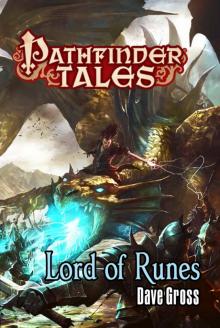 Pathfinder Tales- Lord of Runes
Pathfinder Tales- Lord of Runes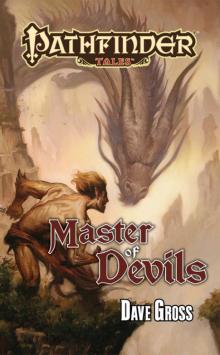 Master of Devils
Master of Devils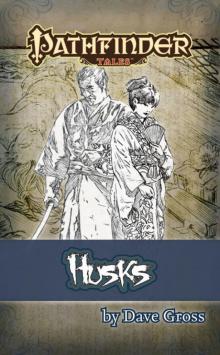 Husks
Husks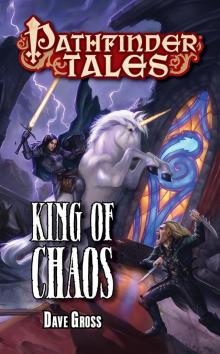 King of Chaos
King of Chaos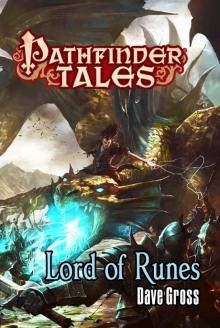 Pathfinder Tales: Lord of Runes
Pathfinder Tales: Lord of Runes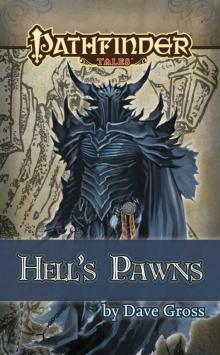 Hell's Pawns
Hell's Pawns Prince of Wolves
Prince of Wolves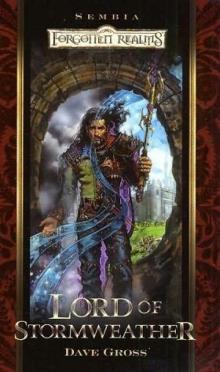 Lord of Stormweather fr-7
Lord of Stormweather fr-7 Queen of Thorns
Queen of Thorns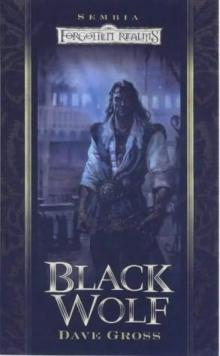 Black Wolf s-4
Black Wolf s-4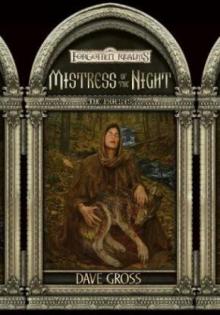 Mistress of the Night p-2
Mistress of the Night p-2